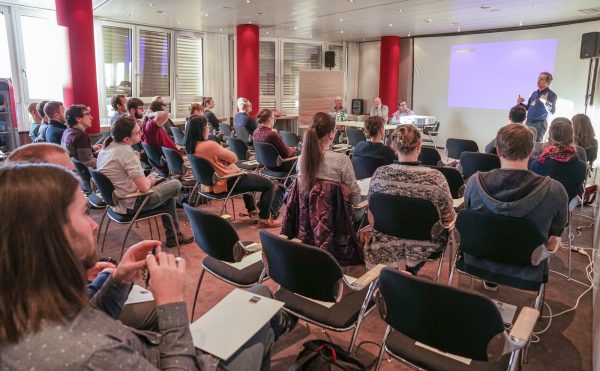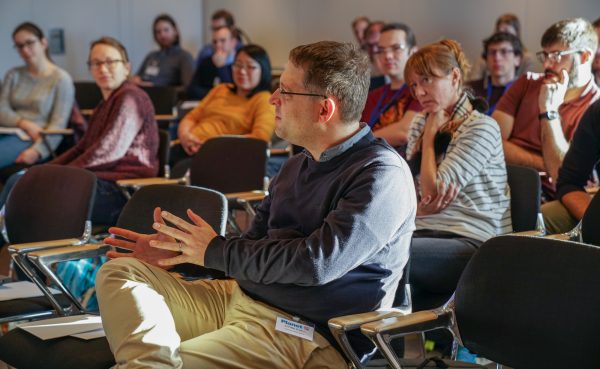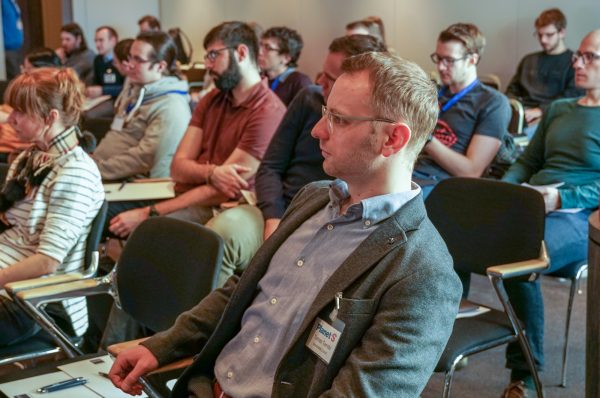Ask the NCCR

In a workshop at the General Assembly members of the PlanetS Board answered questions about the NCCR. “It’s important that you understand how the system in which you work functions,” said PlanetS Director Willy Benz.

Francesco Pepe, Stéphane Udry, Lucio Mayer, and Willy Benz answering questions at the General Assembly 2019. (Photo Sylviane Blum)
Why does PlanetS not offer permanent positions?
The NCCR receives money from the Swiss National Science Foundation (SNSF), but no permanent positions. The SNSF pays for research. With SNSF money the NCCR can hire a graduate student or a postdoc, but only for a finite duration. These are the rules set by SNSF and we have to follow them. With SNSF money the NCCR can also pay for research equipment, for instance for a vacuum pump or a supercomputer, but not for a desk or a laptop. These are considered part of the normal infrastructure and as such must be provided by the universities. These are again the rules…
Permanent positions are decided and funded by the universities/ETHs. These are complex organizations and each has its own rules on how to proceed. In general, a new professor is hired when one retires. Additional positions rarely appear spontaneously, they generally result from special circumstances, for example as part of a commitment to support an NCCR. When a professor retires, it must generally first be shown why this position must be renewed in the same field of research or be re-oriented. In essentially all cases, there will be a job ad followed by a series of interviews conducted by a committee who generally establishes a ranked list of eligible candidates with the rector or the president ultimately appointing the person. This is often a rather lengthy process which can take up to two years to complete. In this process, the presence of an NCCR can be important: the research field already has received a stamp of excellence, generally enjoys more visibility, and therefore might have a higher priority. An NCCR puts pressure on the universities (at least the leading houses) to support it financially and through establishing permanent positions (not only at professor level). So far, within PlanetS the schools created five additional permanent positions, and there will be two more.
These are the rules in Switzerland with its complicated federal landscape and we have no choice but follow them. There are ways to change them, but this would have to be done on a political level, both locally and federally.

Discussions about money, rules and opportunities. (Photo Sylviane Blum)
Couldn’t the SNSF support those people with more money who continue their research after having left the NCCR?
The SNSF has several programmes to support early-career researchers. Ambizione grants are aimed at people who hold a PhD and want to conduct an independent project. The grant covers the researcher’s salary for a maximum of four years and the funds needed to carry out the project. Dan Bower, Caroline Dorn, Maria Drozdovskaya, Janis Hagelberg, and Judit Szulágyi are Ambizione Fellows.
With its Eccellenza Professorial Fellowships and Eccellenza Grants the SNSF supports more advanced young researchers who aspire to a professorship. The Eccellenza funding scheme replaces the former SNSF professorships. 239 researchers responded to the first Eccellenza call in February 2018. The SNSF decided to fund 51 projects for five years with an average budget of 1.6 million francs, or 83 million in total. Among the awardees is Susanne Wampfler of the University of Bern. (See: SNSF career funding schemes)
It might be that a NCCR generates more PhDs and postdocs in a field than permanent positions will ultimately be available (certainly within Switzerland but not necessarily worldwide). But with a PhD in astronomy you are useful in society in general not only as a professor. It would be terrible, if academia was a black hole were bright young people go in and never come out again.

Understanding how the system functions. (Photo Sylviane Blum)
How can members benefit from the NCCR and vice versa?
Roughly 30% of the NCCR money is funding the platforms including the promotion of young scientists, especially women, communication and outreach activities, and technology transfer. This is a substantial amount of money. These platforms provide unique opportunities to benefit from the NCCR beyond just one’s salary. By taking part or organizing various activities like workshops or externships or learn how to write a CV or conduct a job interview, you have many possibilities to augment your skills and open new horizons.
Conversely, PlanetS benefits from the success of its members as it raises the visibility of our science/activities both locally and nationally. So, get all the visibility, prizes, fellowships, and grants you can! In this game, on the science side ERC Grants are considered as the Champions League. The more researchers at PlanetS play this Champion League the greater the chances for success. Currently on the field are David Ehrenreich with “FOUR ACES” and Kevin Heng with “EXOKLEIN”.
As members suggested at the General Assembly, there could also be one or more PlanetS prizes. After the prize for the best poster at the General Assembly 2018 won by Mark Hutchison, other ideas include an award for the best PhD, the best speaker, a special outreach effort, or the most successful technology transfer. The PlanetS Board will think and discuss this.
What happens to a NCCR once its time is up?
In principle, the leading institutions of an NCCR commit to support the Center’s field of research over the long-term, the other participating institutions do not have such a formal commitment. It is important to realize that the permanent positions established during the NCCR are important contributions to this goal as they remain for the long-term. Beyond this, there are no rules and individual institutions are handling the situation differently. Some turn off support of past NCCRs because they want to invest in new ones. Others carry-on the support by creating new entities either by directly funding them or by helping finding private sponsorship. Examples include the Oeschger Centre for Climate Change Research (OCCR) a successor of the NCCR Climate at the University of Bern that ended in 2013 and the Swiss Finance Institute (SFI), a private foundation launched by Switzerland’s banking and finance community in cooperation with leading Swiss universities, initiated by the NCCR FINRISK.
Our plans are to establish a Swiss Institute of Planetary Sciences (SIPS) as the legacy of NCCR PlanetS. For this, we have the task to discuss all elements of SIPS (organization, funding, etc with all participating institutions during phase 2 of PlanetS (2018-2022) so that some aspects can already be implemented for phase 3 (2022-2026). Establishing SIPS will not be an easy task and will require persuading the participating institutions that their potential investment truly generates added value. The work done together within the framework of PlanetS is our best way to illustrate the potentials of an effective national coordination and sharing of expertise and infrastructures as we envision for SIPS.
Previous answers to “Ask the NCCR”:
InsiderS No. 16
InsiderS No. 15

